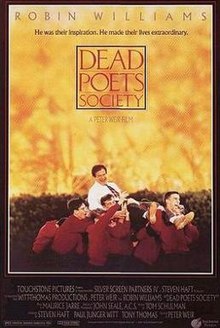← Back to Reviews
in
Dead Poets Society
A 1989 Best Picture Nominee, Dead Poets Society is a handsomely mounted tale of passion and hope and not the passion that the idea of romance conjures, but the kind of passion behind the expression "Carpe Diem."

The late Robin Williams received an Oscar nomination for his performance as John Keaton, a new English teacher at a fancy boys' prep school who has a profound effect on his students through the formation of a very special club and his drive to have his students discover and pursue their individual passion, a drive that has unforeseen consequences on three of his students in particular.
[IMG]https://miro.medium.com/v2/resize:fit:1200/0*knjXbRJwZUNenLvO.jpg[/IMG]
Tom Schulman's Oscar-winning screenplay is rich with tense situations that are driven by almost lyrical dialogue that allows this story to sparkle, despite an unexpected detour to a very dark place which somehow manages to bounce back for a finale that had this reviewer simultaneously wanting to cheer and fight tears.

Director Peter Weir, whose resume would eventually be a textbook on the frailty of the human condition with films like Witness, The Truman Show, and Fearless, lends a joyous yet sensitive directorial eye to this often compelling story that offers riches that the viewer sometimes has to dig for, but this is not the first time Weir's work has run roughshod with my emotions.

Williams delivers one of his most controlled performances that, curiously, commands the screen without overshadowing some strong work from a young Ethan Hawke, Josh Charles, and especially Robert Sean Leonard as Keating's very special students. Mention should also be made of Kurtwood Smith as Leonard's hard-nosed father. The film features first rate production values with John Seale's cinematography and Maurice Jarre's music being standout elements. A very special cinematic journey.
A 1989 Best Picture Nominee, Dead Poets Society is a handsomely mounted tale of passion and hope and not the passion that the idea of romance conjures, but the kind of passion behind the expression "Carpe Diem."

The late Robin Williams received an Oscar nomination for his performance as John Keaton, a new English teacher at a fancy boys' prep school who has a profound effect on his students through the formation of a very special club and his drive to have his students discover and pursue their individual passion, a drive that has unforeseen consequences on three of his students in particular.
[IMG]https://miro.medium.com/v2/resize:fit:1200/0*knjXbRJwZUNenLvO.jpg[/IMG]
Tom Schulman's Oscar-winning screenplay is rich with tense situations that are driven by almost lyrical dialogue that allows this story to sparkle, despite an unexpected detour to a very dark place which somehow manages to bounce back for a finale that had this reviewer simultaneously wanting to cheer and fight tears.

Director Peter Weir, whose resume would eventually be a textbook on the frailty of the human condition with films like Witness, The Truman Show, and Fearless, lends a joyous yet sensitive directorial eye to this often compelling story that offers riches that the viewer sometimes has to dig for, but this is not the first time Weir's work has run roughshod with my emotions.

Williams delivers one of his most controlled performances that, curiously, commands the screen without overshadowing some strong work from a young Ethan Hawke, Josh Charles, and especially Robert Sean Leonard as Keating's very special students. Mention should also be made of Kurtwood Smith as Leonard's hard-nosed father. The film features first rate production values with John Seale's cinematography and Maurice Jarre's music being standout elements. A very special cinematic journey.
